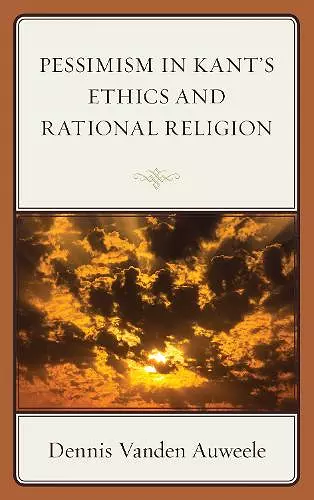Pessimism in Kant's Ethics and Rational Religion
Understanding the complexities of Kant's moral philosophy
Format:Hardback
Publisher:Lexington Books
Published:5th Nov '18
Currently unavailable, and unfortunately no date known when it will be back

This book reveals the pessimistic undercurrents in Kant's moral and religious philosophy, offering a fresh perspective on his ideas about autonomy and rationality.
In Pessimism in Kant's Ethics and Rational Religion, Dennis Vanden Auweele delves into the complexities of Kant’s moral and religious philosophy, revealing a pervasive pessimistic undercurrent. This exploration offers a fresh perspective that not only allows for a thorough assessment of Kantian thought but also provides essential context for understanding the broader implications of his philosophy on autonomy and rationality. Vanden Auweele argues that the Enlightenment, often viewed as a period of philosophical optimism, is challenged by Kant's nuanced views on human nature and morality.
The historical backdrop of the Enlightenment is typically associated with the liberation from traditional moral constraints and dogmatic religious beliefs. However, Pessimism in Kant's Ethics and Rational Religion posits that Kant’s philosophy reveals a more complicated reality. For Kant, the journey toward autonomy and rationality is not an inherent aspect of human nature; rather, it requires significant rethinking and reshaping. This critical examination of human nature as a problem, with autonomy and rationality as potential solutions, underscores the need for educational structures that foster these qualities.
Furthermore, Vanden Auweele discusses Kant’s vision of rational religion, suggesting that it serves a vital pedagogical role in guiding individuals toward autonomy. By reforming historical institutions and providing the necessary incentives, Kant believed that human beings could be educated to act autonomously. This book not only sheds light on Kant's philosophical contributions but also invites readers to reconsider the implications of his work in the context of contemporary moral and religious discourse.
Vanden Auweele has authored an important work on Kant’s philosophy of religion. It brings Kant into conservation with both 19th-century German philosophy as well as abiding themes in Christian theology. Scholars with interest in Kant, his impact Schopenhauer and Nietzsche, as well as how Lutheran and Lutheran Pietist themes shaped Kant’s thought will find this a stimulating and informative book. -- Lawrence Pasternack, Oklahoma State University
This engaging book makes a very persuasive case for a significant current of pessimism in Kant’s philosophy. It reveals a kind of rip current in his thought to which rationalistic readers of Kant are often innocent and which can carry one to surprising shores. Dennis Vanden Auweele has a superb knowledge of Kant’s entire work and an enviable familiarity with an impressive range of commentators. More than that, his handling of the theme brings to life the human dimensions of Kant’s thought, in all their subtlety. Kant is much more than an easy rationalistic optimist, and Vanden Auweele navigates the darker streams of his work in the moral and religious writings, especially in connection with evil. The book is also praiseworthy for its mature way of illuminating Kant by way of well-informed dialogue with figures like Luther, Schopenhauer and Nietzsche. This is an important and worthy contribution to the study of Kant. Very warmly recommended. -- William Desmond, David Cook Chair in Philosophy, Villanova University; Thomas A.F. Kelly Visiting Chair in Philosophy, Maynooth University, Ireland; and professor of philosophy emeritus, Institute of Philosophy, KU Leuven, Belgium
The nineteenth-century pessimists Schopenhauer and Nietzsche are usually read as polar opposites of Kant, the eighteenth-century champion of Enlightenment and human progress. But in this intriguing study, Dennis Vanden Auweele argues that much of the pessimism of the former is already present in the latter. Relying primarily but by no means exclusively on Kant’s philosophy of religion, Vanden Auweele locates Kant’s pessimism in his “dreary perspective on human nature.” The result is a darker Kant than many of us were raised on, but one that is not easy to dismiss. -- Robert B. Louden, University of Southern Maine
ISBN: 9781498580397
Dimensions: 231mm x 164mm x 24mm
Weight: 549g
246 pages